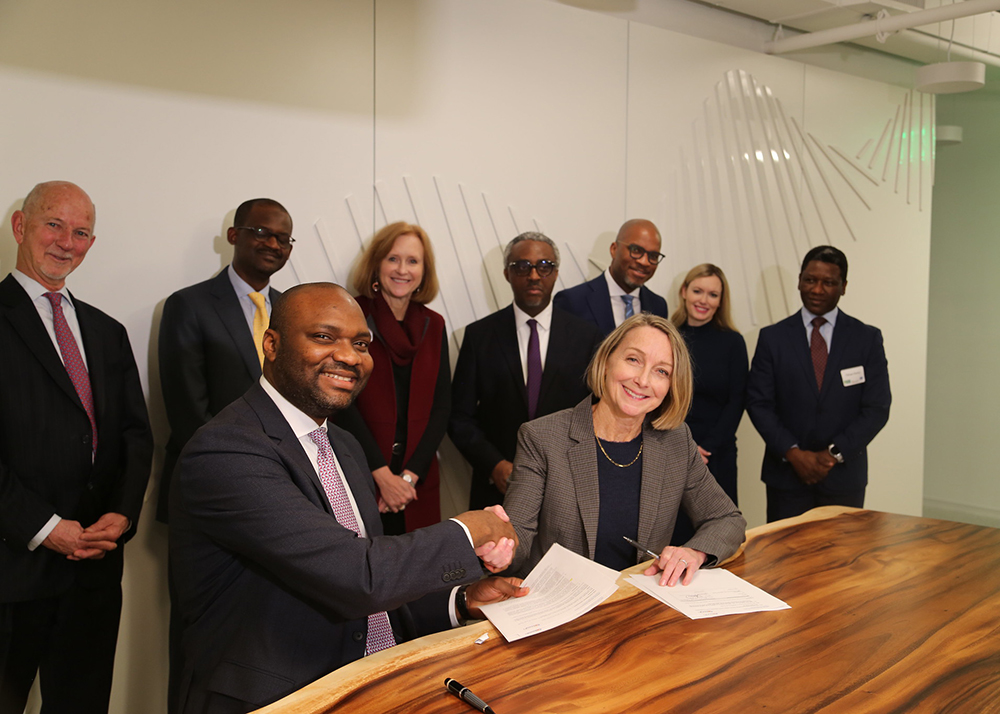The Biotechnology Innovation Organization (BIO) hosted leaders from industry and governments in the U.S. and Africa in an effort to build collaboration against cancer Thursday, the day after the White House announced plans to strengthen support for Africa under the Cancer Moonshot initiative.
A side event to Biden’s U.S.-Africa Leader’s Summit, “Improving Cancer Patient Outcomes in Africa: Public-Private Partnerships” was held at BIO’s Washington D.C. office and united BIO members with officials in the fight against Africa’s top killer.
At the current pace, the annual rate of cancer in Africa is projected to reach 1.4 million new cases and 1 million deaths by 2030, yet more than 20% of African countries lack modern cancer care, according to BIO Ventures for Global Health (BVGH), a non-profit dedicated to global health that was founded by BIO in 2004. For most Africans with cancer, diagnosis comes very late, and the lack of treatment on the continent means the disease is generally a death sentence, says a BVGH report.
Government and private efforts

Thursday’s event at BIO featured a presentation on newly announced plans to increase Cancer Moonshot activities in support of Africa, including support for new technology, clinical trial development, and research from a number of federal agencies.
The Cancer Moonshot is a White House initiative with a stated mission to “reduce the death rate from cancer by at least 50% over the next 25 years, and improve the experience of people and their families living with and surviving cancer.” Specific undertakings announced by the White House last week would help African countries build research capacity, target cervical cancer and prostate cancer, and expand access to radiotherapy.
In addition to federal support, the White House said the private sector has promised approximately $130 million in new efforts to fight cancer in Africa, and several industry leaders from among BIO’s membership announced commitments of support on Thursday.
BIO’s own efforts to support research will include a program to bring promising African entrepreneurs to the June 5-8 BIO International Convention in Boston, BIO Interim CEO Rachel King told the gathering. The entrepreneurs will receive free partnering passes and support in the lead-up to the event.
BVGH joins strategic partnership
The co-hosts for Thursday’s event were BIO-founded BVGH and the Nigeria Sovereign Investment Authority (NSIA). Previous collaboration by BVGH and NSIA to target cancer in Africa includes supporting the NSIA-LUTH Cancer Center (NLCC) in Lagos, Nigeria.
At Thursday’s gathering, BVGH and NSIA signed a five-year strategic partnership agreement focused on training healthcare professionals, providing access to medicine, and research partnerships and projects.
BVGH used the occasion to promote their recent commitments to addressing cancer in Africa:
- Expanding access to FDA-approved cancer drugs to treat an additional 10,000 African cancer patients over the next three years through collaboration with international pharmaceutical companies and U.S. cancer centers.
- Working through BVGH’s African Consortium for Cancer Clinical Trials (AC3T) program to facilitate five research projects, build capacity to conduct rigorous clinical research at 50 African sites, promote African primary investigator’s research interests on the AC3T platform, and coordinate the implementation of observational clinical studies.
- Training an additional 5,000 African healthcare professionals in the management of cancer patients, by leveraging BVGH’s network of more than 30 U.S. academic cancer centers.
The U.S.-Africa Leaders Summit
Thursday’s gathering was an official side-event to last week’s U.S.-Africa Leaders Summit, hosted in Washington D.C. by the White House. The Summit was held to seek improved U.S.-Africa trade, promote peaceful development, and address climate change.
The Summit dealt with agricultural development during the U.S.-Africa Business Forum discussion on agribusiness.
Agriculture employs two-thirds of Africa’s workforce and is responsible for 14% of GDP. Africa’s Agribusiness is expected to be worth more than $1 trillion by 2030, and it has the potential to spur broad-based economic growth.
But this segment also faces challenges—like climate change, which spreads pathogens that hurt crops. And food loss cuts revenue of developing countries by 15% or more.
Biotech boosts African agriculture
Biotech solutions for agriculture include developments to protect essential African crops like cassava and bananas. “There are currently several gene-edited plants under development … that are both food and cash crops for smallholder farmers,” in Africa, according to Nature.
“Biotechnology is a powerful tool to modify genetics in crops and animals that would otherwise be impossible through classical breeding. Harnessing this offers Africa an unparalleled opportunity to circumvent a range of challenges in crop and animal agriculture,” Jeremy Ouedraogo, head of AUDA-NEPAD’s biosafety program told Nature.
But realizing the potential requires updates to current regulations on gene editing in Africa, which are based on an outdated understanding of biotech crops among the public, says a study published last month.
Since 1998, when South Africa became the first country on the continent to allow biotech crops—insect-resistant cotton followed by maize and soybeans—only six other African countries have approved gene-edited crops.
“Africa faces a significant food security dilemma,” with the UN saying 20% of Africa’s 1.2 billion people deal with chronic hunger, says an analysis in AllAfrica. “Farmers in Africa are anticipated to embrace biotech crops as biotechnology knowledge grows, possibly benefiting their families and the continent.”




